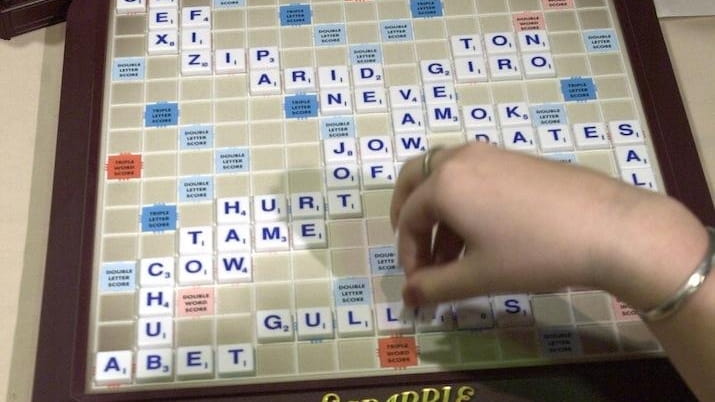Already taking nominations for 2015's best word

Selfie, unfriend and bromance are among the 5,000 new words added to the Scrabble dictionary, Hasbro said. Credit: Getty Images
I was helping my grandson the other day with his sight words. He just turned 4, and sight words are words beginning readers have to memorize.
He was doing great until we came to "they." He peered, and I started to tell him to sound it out. Then I stopped, realizing the inadequacy of that advice. Sound it out? Would that be "ey" as in they? Or key? Or eye? Same two letters, three different pronunciations.
That's when I realized the point of memorizing sight words -- "is," "she," "the" and the like -- is not simply because they appear frequently, which they do, but because they aren't easily sounded out by following phonetic rules.
And that reminded me of the beautiful confoundedness of the English language. It has all sorts of rules that must be broken in all sorts of ways but not all the time. Its degree of arbitrariness would be rejected on appeal in any court I know.
Linguists argue about whether English is difficult to learn in comparison to other languages, and each side makes some compelling points, but I've always thought that learning English was a fairly high bar to making it in this country for someone who's not from here.
Comedian George Carlin loved to point out the absurdities of English. He asked why it is, for example, that we park in a driveway and drive on a parkway. And he wondered, rather famously, what would be left on a table if you had 24 odds and ends and 23 fell off.
One could continue on end.
Why do flammable and inflammable mean the same thing?
One goose, two geese, one moose, two . . . um . . . moose.
What's with the pronunciation of yacht?
Why is a pineapple neither pine nor an apple?
Balancing the frustration of the illogic is the exquisite thrill of learning a new word. I see that, too, in my grandson, whose delight in such discoveries is palpable. He loves big new words. He never lets on when he hears something interesting, but I've lost count of the times we've used such a word and a few days later it comes back to us, presented with a sly smile. Like when he announced the other day: "Technically, this glue stick doesn't exist anymore because it's empty."
Such statements have formed the basis for entire courses in philosophy, but I was impressed that he nailed "technically."
In that vein, 2014 also was a terrific year for me. In September, a reader responding to something I had written introduced me to a new word: kakistocracy.
I was forced to dive into a dictionary and there it was -- kakistocracy: government by the least qualified or most unprincipled citizens.
Who knew such a fabulously useful word even existed?
I immediately thought of Nassau County's government, New York's roster of indicted or convicted state legislators, the entirety of Congress, and every elected official who's ever engaged in a conflict of interest whether he or she denied it or not.
The word derives from the Greek kákistos, meaning "worst." It first appeared in an 1829 book by English satirist Thomas Love Peacock. Pretty much since then, pundits here and abroad have worried that our federal government is sliding inexorably into kakistocracy.
Or its closely related cousin, kleptocracy: government by those who seek personal gain and status at the expense of those they govern. It appeared around the same time as kakistocracy and comes from the Greek word for "thief." They are not mutually exclusive terms.
So now I've got my own high bar for success in 2015: Find a word as good as kakistocracy. I'm open to suggestions from any field. It doesn't have to be from politics. As long as the word is new to me.
Technically speaking.
Michael Dobie is a member of the Newsday editorial board.

